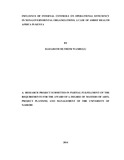| dc.description.abstract | NGO’s operational efficiency involves the capability of an organization to deliver services to its people in the most cost-effective manner possible while still ensuring the high quality of its products, service and support. Operational efficiency is often achieved by streamlining a company's core processes in order to more effectively respond to continually changing market forces in a cost-effective manner. The study was guided by the following objectives; to assess the extent to which organizational controls influence operational efficiency in NGOs, to establish the extent to which operating controls influence operational efficiency in NGOs, to examine the extent to which personnel controls influence operational efficiency in NGOs, and lastly to investigate the extent to which periodic reviews influence operational efficiency in NGOs. The study would be significant to the NGO’s as it would give insights to them on the importance of integrating internal control measures in their operations and how it would help them in achieving their mandate as well as improve operational efficiency. The study adopted a descriptive research design. The target population of the study was all the employees and managers at Amref Health Africa in Kenya. In the study the target population was 259. The study employed census sampling technique and purposive sampling technique in selecting the respondents. Data was collected using questionnaires and interview schedules. Data was analyzed using descriptive statistics presented using APA tables. The findings revealed that the organization makes use of the human resource controls, 85% of the total number of respondents identified planning as the most common method of operating control used, 80% of the respondents were of the opinion that work is assigned to personnel having the degree of technical training and proficiency required in the circumstances, 87% of the total number of respondents were of the opinion that periodic reviews in the organization facilitated accurate accounting since the system could generate real-time costs of operation, The study recommends that internal controls should be used to support the organization in achieving its objectives by managing its risks and the organization should determine the various roles and responsibilities with respect to internal controls. The governing body and management should foster an organizational culture that motivates members of the organization to act in line with risk management strategy and policies on internal controls set by the governing body. | en_US |

